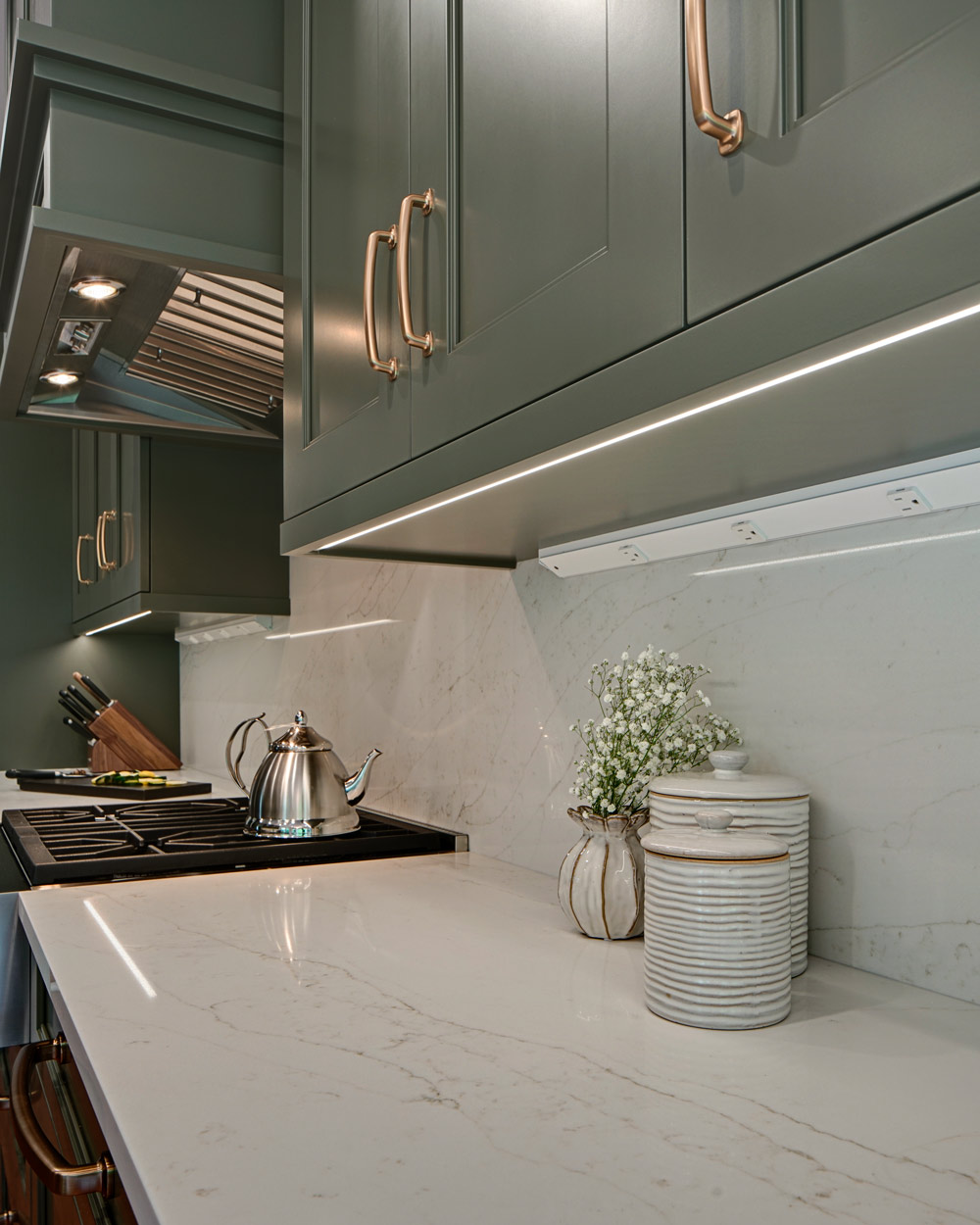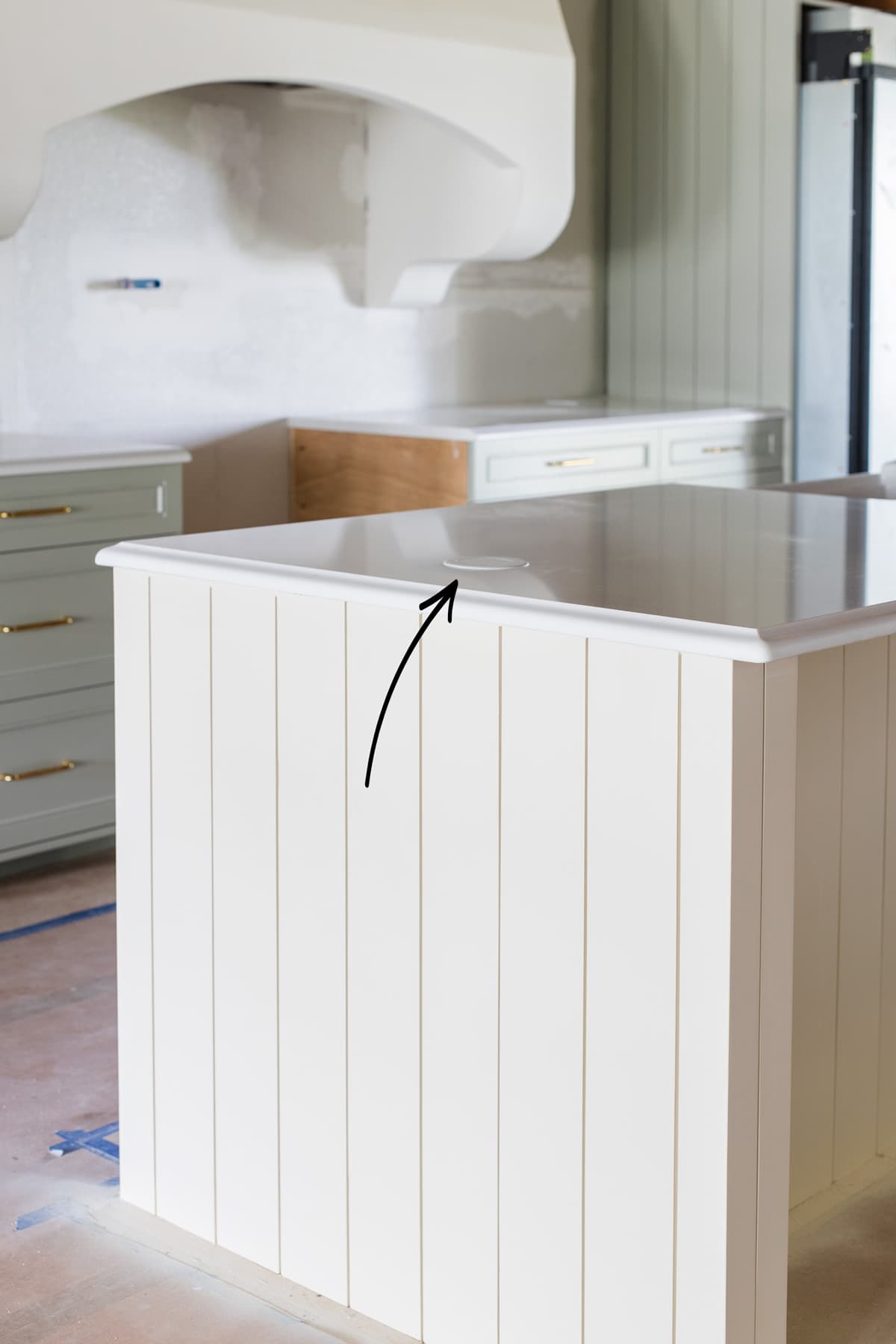Hiding outlets on a kitchen counter can enhance your kitchen’s look. It keeps your space neat and clutter-free.
A clean kitchen counter is not just about aesthetics. It’s also about functionality and safety. Exposed outlets can disrupt the flow of your kitchen design. They can also pose a risk, especially in busy kitchens. By concealing them, you create a seamless and safe space.
There are many creative ways to hide these outlets. From pop-up outlets to under-cabinet solutions, the options are varied. This guide will explore practical and stylish methods. Let’s transform your kitchen into a sleek, functional space.

Credit: www.drurydesigns.com
Benefits Of Hidden Outlets
Hidden outlets on kitchen counters provide several significant advantages. They improve the kitchen’s look, make it safer, and help keep the area tidy.
Aesthetic Appeal
Hidden outlets make the kitchen look clean and modern. Without visible outlets, the counter looks sleek. Matching the kitchen’s design with no visible outlets interrupting the flow is more effortless.
Hidden outlets can be placed under cabinets or behind appliances. This way, you can access power without spoiling the look of your kitchen. This design choice helps maintain a minimalist kitchen style.
Safety Considerations
Hidden outlets also increase kitchen safety, but exposed outlets can be risky, especially in a kitchen where water is often used. Keeping outlets hidden reduces the chance of water-related accidents.
Hidden outlets help keep cords out of the way. This reduces the risk of tripping over loose cables. It also keeps the workspace clear and safe, preventing potential kitchen accidents.
| Benefit | Description |
|---|---|
| Aesthetic Appeal | Makes the kitchen look clean and modern. |
| Safety Considerations | Reduces risk of water-related accidents and tripping over cords. |
In summary, integrating hidden outlets into your kitchen design can enhance its beauty and safety.
Choosing The Right Outlets
Hide kitchen counter outlets by installing pop-up outlets that remain hidden until needed. Under-cabinet power strips offer a sleek solution, keeping outlets out of sight.
Choosing the right outlets can transform your kitchen’s appearance. It helps keep your space clean and clutter-free. With so many options, it can be hard to decide. Below, we’ll explore two great choices for hiding outlets on your kitchen counter.
Pop-up Outlets
Pop-up outlets are sleek and modern. They stay hidden until needed. You can install them directly into your countertop. Just press down, and the outlet pops up for use. Once done, push it back down. These outlets save space and look great. They also come with USB ports for charging devices. Pop-up outlets are perfect for a seamless kitchen design.
Under-cabinet Outlets
Under-cabinet outlets hide under your upper cabinets. They keep your backsplash clean and uncluttered. You can plug in appliances without visible cords. This keeps your countertop clear. These outlets are easy to install and use. They offer a neat solution for a tidy kitchen. You can also add LED lights for extra lighting. Under-cabinet outlets are both functional and stylish. “`
Installation Preparation
Preparing for the installation of hidden outlets on your kitchen counter is crucial. Proper preparation ensures a smooth and successful process. This involves gathering the necessary tools and planning the layout effectively. Let’s dive into the steps involved in the installation preparation.
Tools Needed
To start, gather all essential tools. Having everything ready saves time and effort.
- Screwdriver
- Measuring tape
- Pencil
- Drill
- Level
- Outlet covers
- Wire strippers
Ensure all tools are in good condition. This helps avoid any interruptions during installation.
Planning The Layout
Next, plan the layout. Decide where you want to place the hidden outlets.
Measure the counter space carefully. Mark the spots where the outlets will go. Use a pencil for markings so adjustments can be made quickly.
Check for any obstacles underneath the counter. Ensure the chosen spots are clear of pipes or other hindrances.
Use a level to make sure your markings are even. This guarantees a professional look.
Proper planning ensures the outlets are both functional and discreet. Taking the time now saves headaches later.
Installing Pop-up Outlets
Pop-up outlets offer a sleek, modern solution for hiding outlets on your kitchen counter. They remain hidden when not in use, providing a clean and uncluttered look. Installing pop-up outlets is a straightforward process that adds functionality and style to your kitchen. Let’s walk through the steps to get your pop-up outlets installed.
Marking The Countertop
First, decide where you want the pop-up outlets. Choose locations that are convenient for appliance use. Mark these spots on the countertop with a pencil. Double-check the measurements to ensure accuracy. This step is crucial for a proper fit and installation.
Cutting And Fitting
Next, drill creates a pilot hole in the marked spots. Then, use a jigsaw to cut out the holes. Make sure the holes are the right size for the pop-up outlets. Insert the outlets into the holes to check the fit. Adjust the cuts if necessary. Ensure the outlets sit flush with the countertop surface.
Now, secure the outlets according to the manufacturer’s instructions. This usually involves tightening screws or clamps. Finally, connect the outlets to the electrical wiring. Ensure all connections are secure and safe. Turn on the power and test the outlets to ensure they work correctly.
You can successfully install pop-up outlets in your kitchen by following these steps. They provide a neat and functional solution for hiding outlets, enhancing the overall aesthetic of your kitchen space.
Under-cabinet Outlet Installation
Installing outlets under your kitchen cabinets can be a smart way to hide them. This keeps your kitchen looking sleek and modern. Let’s dive into the steps for under-cabinet outlet installation.
Finding The Right Spot
First, determine where you need the outlets. Think about the appliances you’ll use. You might need outlets near your coffee maker or toaster.
Use a stud finder to locate the wall studs. This helps you avoid drilling into them. Mark the spots where you want to install the outlets. Make sure these spots are easy to reach but hidden from view.
Securing The Outlet
Turn off the power to the area where you’ll work. Safety first!
Cut a hole in the cabinet’s underside for the outlet box. Use a template to make sure the hole is the right size.
Insert the outlet box into the hole. Secure it with screws.
- Connect the wires to the outlet. Follow the color codes: black to black, white to white, and green to ground.
- Screw the outlet into the box. Make sure it’s tight and secure.
- Attach the outlet cover. This gives it a clean look.
Turn the power back on and test the outlet. Plug in a small appliance to make sure it works.
Finally, enjoy your new, hidden outlets! Your kitchen will look neat.
Electrical Wiring Tips
Safety and proper wiring are key when hiding outlets on a kitchen counter. Ensuring your electrical work is neat and compliant is essential. Let’s explore some practical electrical wiring tips to help you achieve a clean and safe kitchen counter.
Safety First
Always turn off the power before starting any electrical work. Use a voltage tester to confirm the power is off. Wear rubber-soled shoes and avoid working in wet areas. Have a fire extinguisher nearby. Keep the workspace well-lit and free of clutter. These precautions will help prevent accidents and ensure a safe project.
Connecting Wires
Strip the wire ends carefully, removing about 1/2 inch of insulation. Use wire nuts to connect wires securely. Twist wires together before placing them in the wire nut. Ensure connections are tight to avoid any loose connections. Place connected wires neatly into the electrical box. Follow color codes: black to black, white to white, and green or bare wire to ground. Label your wires if necessary, for future reference.
Finishing Touches
Once you’ve hidden the outlets on your kitchen counter, it’s time to add the finishing touches. This step ensures everything looks neat and functions well. Let’s explore how to test the outlets and seal and clean the area.
Testing The Outlets
Testing the outlets after installing them is crucial. This step ensures they work correctly and safely. Follow these steps:
- Plug in a small appliance, like a toaster.
- Turn the appliance on and check if it works.
- Repeat with different outlets to ensure all are functional.
If an outlet doesn’t work, check the wiring. Ensure all connections are secure. If the problem persists, consult a professional electrician.
Sealing And Cleaning
With the outlets tested, the next step is sealing and cleaning. This process keeps your counter looking tidy and maintains safety. Follow these steps:
- Use a silicone sealant around the outlet edges. This prevents water from entering.
- Allow the sealant to dry completely. This usually takes a few hours.
- Wipe the counter and outlet covers with a damp cloth. Remove any dust or debris.
For a more polished look, choose a sealant that matches your counter color. Regular cleaning keeps the area neat and extends the life of your outlets.

Credit: erinzubotdesign.com
Maintenance And Troubleshooting
Keeping outlets hidden on a kitchen counter can improve aesthetics. However, maintaining and troubleshooting these hidden outlets is crucial. Regular maintenance ensures safety and functionality. Troubleshooting helps resolve common issues quickly.
Regular Checks
Perform regular checks to keep your hidden outlets in good condition. Inspect the outlet covers for any wear or damage. Ensure the outlets are still securely mounted. Look for any signs of electrical issues like sparks or a burning smell. Test each outlet with a small appliance to confirm they work correctly.
Common Issues
Several common issues can arise with hidden outlets. Sometimes, the outlet cover might become loose. If this happens, tighten the screws or replace the cover. Another issue is outlets not providing power. This could be due to a tripped circuit breaker. Check your breaker panel and reset any tripped breakers.
Occasionally, outlets might get dirty or blocked. Clean them gently with a dry cloth. Ensure no debris is obstructing the outlet. If you notice persistent problems, it might be best to call a professional electrician. They can identify and fix deeper electrical issues safely.

Credit: www.jennasuedesign.com
Frequently Asked Questions
How Can I Hide Kitchen Counter Outlets?
You can hide outlets using pop-up outlets, under-cabinet power strips, or decorative outlet covers. These options maintain functionality while keeping your kitchen counter clutter-free and stylish.
What Are Pop-up Outlets?
Pop-up outlets are retractable ones that can be hidden within the countertop when not used. They provide a sleek and modern solution for maintaining a clean kitchen look.
Are Under-cabinet Power Strips Effective?
Yes, under-cabinet power strips are effective for hiding outlets. They are mounted underneath cabinets, offering easy access without disrupting the counter space.
Can Decorative Covers Hide Outlets?
Decorative covers can effectively hide outlets. They blend with the kitchen design, making outlets less noticeable while still accessible when needed.
Conclusion
Hiding outlets on your kitchen counter keeps your space neat. It’s easy and effective. Use creative solutions like pop-up outlets or under-cabinet strips. These ideas maintain your kitchen’s style. Safety is also key. Ensure all installations follow electrical codes. A tidy kitchen is both beautiful and functional.


